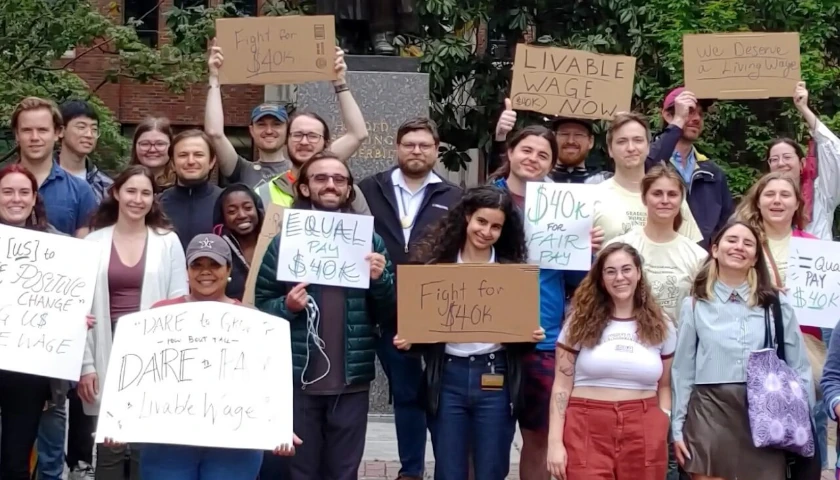by Ashley Varner
While the media breathlessly covered the final two weeks of this year’s term at the U.S. Supreme Court, an important anniversary quietly came and went — the fourth year of freedom from forced union participation by public-sector employees.
On June 27, 2018, the justices banned mandatory union membership, dues and fees for government employees, overturning more than 40 years of court precedent that required government employee union participation as a condition of employment.
Continuing the Washington Post’s time-honored tradition of espousing the wrong take, columnist Charles Lane recently dismissed the decision as a nothing burger.
He wrote:
“(I)n the four years since Janus v. AFSCME, a landmark 2018 decision affecting the financing of public-sector unions, the ruling’s actual impact — to the extent it’s detectable at all — has validated neither the hopes of those who welcomed it nor the fears of those who did not. To the contrary, new research suggests the pre-Janus status quo remains remarkably unchanged.”
It’s a line the public sector unions have been peddling for years.
On the ruling’s second anniversary in 2020, in fact, American Federation of Teachers’ (AFT) President Randi Weingarten boasted, “What was intended by the people who brought this case was to defund us. Not simply erode the fee-payers but to try and erode membership. But that hasn’t happened.”
Yes, it has.
An analysis of the 2020-2021 school year, for example, showed a sharp decrease in membership for teachers’ unions across the country, including Connecticut.
AFT Connecticut, the state’s affiliate for the American Federation of Teachers (AFT), suffered a loss of 2.5 percent of its members. And nationally, both Weingarten’s AFT and the National Education Association (NEA) saw 2.1 and 2.3 percent drops in their membership, respectively — the equivalent of losing the entire working membership of union affiliates in Los Angeles, Chicago, Miami and Philadelphia combined in a single year.
What could possibly make teachers across the country want to leave their unions in droves?
Could it be because during the 2020-21 school year, AFT Connecticut paid its president Janis Hochadel $173,000, first vice-president John Brady $152,000, and 16 other employees between $120,000-$150,000 each?
It also spent $400,000 on political activities and lobbying, and $26,000 on “contributions, gifts and grants”.
If that isn’t bad enough, AFT Connecticut sends money to the parent AFT, which for the same year paid Weingarten more than $427,000.
Teachers’ union leaders are very generous to themselves with the dollars they take from teachers’ paychecks.
As more and more teachers learn they have a right not to fund labor leaders’ lavish lifestyles, especially when gas and groceries become increasingly expensive, they begin doing the math on how stopping union dues deductions could alleviate some of these financial burdens.
The problem is that most teachers are not even aware of their rights under Janus, and that’s because the teachers’ union officials do not want them to be educated about their options.
Government employee unions responded to Janus by adopting a variety of still-being-litigated defensive strategies, including:
- only processing membership cancellations during annual escape periods as short as a few days;
- ignoring, delaying or fighting each request, forcing individual workers to take the unions to court;
- subjecting union defectors to workplace harassment; and,
- when all else fails, simply forging the worker’s signature on membership documents.
On top of that, and for all their anti-bullying campaigns, teachers’ unions are among the biggest bullies in the country. Union representatives tell their members if they leave the union, they have no alternative for liability insurance and they’ll lose their benefits.
This simply isn’t true, and that’s why the Freedom Foundation launched a national outreach campaign to educate the educators about their alternatives to union membership.
In March 2020, Randi Weingarten began wielding her power to keep schools closed and children locked into “Zoom school”. Good, dedicated teachers became increasingly frustrated at being used as pawns in her political game to gain benefits she never would have achieved at a typical bargaining table, and many decided they didn’t want her speaking for them anymore.
Randi Weingarten overplayed her hand and it caused many rank-and-file members to take notice of how their money was being spent – and they decided to keep that money for themselves.
– – –
Ashley Varner is the vice president of communications and federal affairs for the Freedom Foundation.
Photo “Mark Janus” by Mark Janus/Facebook.





